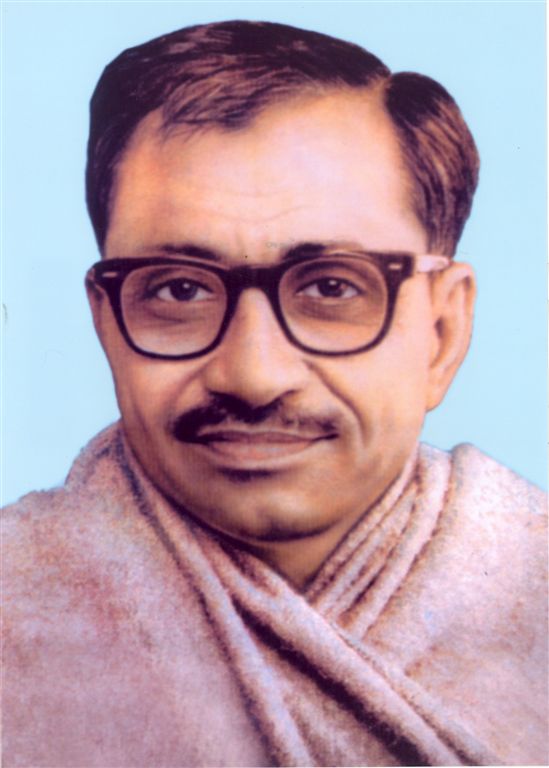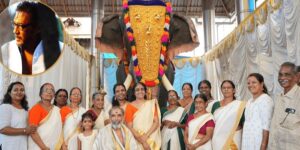Editors Note :Pandit Deendayal Upadhyay (25 September 1916 – 11 February 1968) was an Indian politician who was one of the leaders of the Bharatiya Jana Sangh, The celebration surrounding his birth centenary was promoted along with his idea of Integral Humanism, a rejection of both western Marxism and capitalism, as well as supposedly taking their good points. The Deen Dayal Research Institute was set up to propagate his ideas. The philosophy of Integral Humanism advocates the simultaneous and integrated program of the body, mind and intellect and soul of each human being. His philosophy of Integral Humanism, which is a synthesis of the material and the spiritual, the individual and the collective, bears eloquent testimony to this. He visualized for India a decentralised polity and self-reliant economy with the village as the base. In many ways it was a revamp of the Gandhian ideal.
Upadhyaya was of the opinion that Integral Humanism followed the tradition of advaita developed by Adi Sankara. Non-dualism represented the unifying principle of every object in the universe, and of which humankind was a part.
However , as its name suggests, this Integral Humanism was in many ways an internalisation of these very western ideas within the Hindu mind, to make it even more colonised and detached from its spiritual roots. It was a revamp of those very unspiritual western ideas in some glib Hindu garb replete with cosy phrases. Instead of promoting outdated idealists such as Upadhaya, modern Hindus should be looking at the pioneers of modern Hindu thought such as Ram Swarup and Sita Ram Goel. But the problem with these figures is not their commitment to Hindu Dharma – that is unquestioned. Their crime was to dare to criticise the RSS and its minions.
That breaks the unspoken rule. Do not criticise the ‘tribe’. Show ‘group think’ or you become an un-person like Trotsky in Stalin’s USSR. Integral Humanism played no role in the debate as globalisation took place with neoliberalism and the Chicago school of economics replacing state intervention and Keynesianism, with crony capitalism, unfettered free market and widening social disparities. Now that this neoliberal model is broken and stagnant, Integral Humanism stands out as being completely irrelevant. HHR
Integral Hinduism
 Forty years later, ca. 1965, Deendayal Upadhyaya adopted the promising term “Integral Humanism”, in Hindi Ekatmata Manavavad or Ekatma Manavadarshan. This seemed to transcend the division of mankind in box-type nations. Moreover, unlike nationalism, it did not seem to have been borrowed from the West, in spite of appearances. In the 1930s, the French Catholic political thinker Jacques Maritain had launched the notion of “humanisme intégral”, the ideological core of what was to become the dominant post-war movement of Christian Democracy. But it is unlikely that that is where Upadhyaya had the term from: at that time, there was still a large barrier between the French and Indian public spheres, and the term had been used cursorily by Indian writers as well, being a rather evident concept.
Forty years later, ca. 1965, Deendayal Upadhyaya adopted the promising term “Integral Humanism”, in Hindi Ekatmata Manavavad or Ekatma Manavadarshan. This seemed to transcend the division of mankind in box-type nations. Moreover, unlike nationalism, it did not seem to have been borrowed from the West, in spite of appearances. In the 1930s, the French Catholic political thinker Jacques Maritain had launched the notion of “humanisme intégral”, the ideological core of what was to become the dominant post-war movement of Christian Democracy. But it is unlikely that that is where Upadhyaya had the term from: at that time, there was still a large barrier between the French and Indian public spheres, and the term had been used cursorily by Indian writers as well, being a rather evident concept.
Let us nonetheless note the parallel: in 1930s’ France, there was a militantly secular regime, the 3rd Republic, and an advancing threat of Communism, exactly like in 1960s’ India. Both were effectively atheist but called themselves “humanist”, which had the effective meaning of “non-theist”. Against these two arms of atheism, the core counter-insight from the religiously committed side was that “a humanism which denies man’s religious dimension, is not an integral humanism”. Materialism amputates the natural religious dimension from man, and this has to be restored.
So, in name, “integral humanism” had a touch of genius. It sounds so innocent and positive, something that nobody can object to. That is why, in spite of being the official ideology of RSS and BJP, in which every member is trained, it is never mentioned in textbooks by “experts” on Hindutva. Out of an unscholarly political activism, these “experts” prefer to push more negatively-sounding terms, of which “Hindu nationalist” is still the kindest. It is unthinkable to read a textbook on the Labour Party without coming across the word “socialism”, yet so noxious is the intellectual climate in both India and India-watching, that it is entirely the done thing to write expert introductions on the RSS-BJP without mentioning its actual ideology.
 Alas, once Upadhyaya went beyond the basics, he relapsed into talk that can only be explained as nationalistic. The central concept in his system is Chiti, the “national soul”. This notion had been dear to Johann Herder, the Romantic theorist of nationalism ca. 1780. Last winter in Pune and Mumbai, the heartland of Hindu nationalism, during Upadhyaya’s centenary, I noticed that this rather simplistic ideology went through a revival, with some convivial symposiums but few new ideas. It was again around this nationalist notion of Chiti that the main churning took place.
Alas, once Upadhyaya went beyond the basics, he relapsed into talk that can only be explained as nationalistic. The central concept in his system is Chiti, the “national soul”. This notion had been dear to Johann Herder, the Romantic theorist of nationalism ca. 1780. Last winter in Pune and Mumbai, the heartland of Hindu nationalism, during Upadhyaya’s centenary, I noticed that this rather simplistic ideology went through a revival, with some convivial symposiums but few new ideas. It was again around this nationalist notion of Chiti that the main churning took place.
The concept of a “national soul” could make sense as a purely descriptive attempt at encapsulating the statistical tendency of a “nation” towards a certain mentality. But even as a statistical average, it is susceptible to serious evolution.
One example. The ancient Romans were known for their organizing power, and this is what allowed them to defeat the fearless but less organized Gauls and Germans. But then Arminius, a German mercenary in the Roman army, learnt about these organizing skills, returned to his country, organized a German army, and defeated the Romans. It was the first time the Germans got associated with organizing skills, a great tradition of theirs ever since. By contrast, after holding out as great organizers for several more centuries, the Italians became proverbially chaotic, great artists but lousy strategists or politicians. The “national soul” is an entity subject to change. They know all about cuisine and amore, but you wouldn’t entrust any organizational task to them.
 While not very precise as a descriptive term, Chiti is even worse as a normative concept. The stereotype of “the drunken Irish” may have a grain of truth in it, but for Irish nationalists, it is hardly a value worth defending. I don’t know what the Hindu/Indian national soul is (the first European travellers in Asia, not colonialists yet, had stereotypes of “the violent Muslims”, “the indolent Buddhists”, “the perverse Chinese”, and yes, “the deceitful Hindus”), but I imagine it may also have some less desirable traits, not really worth upholding. In Upadhyaya’s day, Communism was a major concern, but it was not wrong because it failed to accord with the Indian Chiti — it did not accord with the Russian or Chinese Chiti either. Any serious critique of Communism or other challenging ideologies can perfectly be made without reference to the “National Soul”.
While not very precise as a descriptive term, Chiti is even worse as a normative concept. The stereotype of “the drunken Irish” may have a grain of truth in it, but for Irish nationalists, it is hardly a value worth defending. I don’t know what the Hindu/Indian national soul is (the first European travellers in Asia, not colonialists yet, had stereotypes of “the violent Muslims”, “the indolent Buddhists”, “the perverse Chinese”, and yes, “the deceitful Hindus”), but I imagine it may also have some less desirable traits, not really worth upholding. In Upadhyaya’s day, Communism was a major concern, but it was not wrong because it failed to accord with the Indian Chiti — it did not accord with the Russian or Chinese Chiti either. Any serious critique of Communism or other challenging ideologies can perfectly be made without reference to the “National Soul”.
Here again, Chiti serves as a secular-sounding escape route from a religious category. That, after all, was part of Upadhyaya’s agenda. Alright, his term “Integral Humanism” was bright, and the best possible secular-sounding approximation to a perfect translation of the Hindu term Dharma. What Upadhyaya was really getting at, was that Indians have a mentality in common that oozes out from Hinduism. The “idea of India” that secularists like Shashi Tharoor or Ramachandra Guha like to preach about, is but a secular nod to the unmentionable term Hinduism. However, rather than being proud of his Hinduism as the source of integral-humanist values, Upadhyaya, like most Sanghi ideologues ever since, was in the business of downplaying and hiding this Hinduism behind secular terms. His “integral humanism” ended up as the equivalent of the secularists’ “idea of India”. He pioneered what was to become “BJP secularism”.































